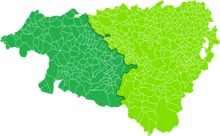| Revision as of 13:52, 24 June 2017 editMr KEBAB (talk | contribs)Extended confirmed users16,959 edits rm not needed← Previous edit | Revision as of 21:04, 31 July 2017 edit undoCalliopejen1 (talk | contribs)Administrators132,969 edits Undid revision 783459050 by Ettrig (talk)Next edit → | ||
| Line 1: | Line 1: | ||
| ⚫ | {{Expand French|date=December 2008|Pyrénées-Atlantiques|topic=geo}} | ||
| {{Infobox department | {{Infobox department | ||
| <!-- See Template:Infobox department for additional fields and descriptions --> | <!-- See Template:Infobox department for additional fields and descriptions --> | ||
| Line 141: | Line 143: | ||
| ==References== | ==References== | ||
| {{Reflist}} | {{Reflist}} | ||
| ⚫ | {{Expand French|date=December 2008|Pyrénées-Atlantiques|topic=geo}} | ||
| {{DEFAULTSORT:Pyrenees-Atlantiques}} | {{DEFAULTSORT:Pyrenees-Atlantiques}} | ||
Revision as of 21:04, 31 July 2017
You can help expand this article with text translated from the corresponding article in French. (December 2008) Click for important translation instructions.
|
| Pyrénées-Atlantiques (Pirinio Atlantikoak) | |
|---|---|
| Department | |
 Coat of arms Coat of arms | |
 Location of Pyrénées-Atlantiques in France Location of Pyrénées-Atlantiques in France | |
| Coordinates: 43°15′N 0°50′E / 43.250°N 0.833°E / 43.250; 0.833 | |
| Country | |
| Region | Nouvelle-Aquitaine |
| Prefecture | Pau |
| Subprefectures | Bayonne Oloron-Sainte-Marie |
| Government | |
| • President of the General Council | Georges Labazée |
| Area | |
| • Total | 7,645 km (2,952 sq mi) |
| Population | |
| • Total | 664,057 |
| • Rank | 36th |
| • Density | 87/km (220/sq mi) |
| Time zone | UTC+1 (CET) |
| • Summer (DST) | UTC+2 (CEST) |
| Department number | 64 |
| Arrondissements | 3 |
| Cantons | 27 |
| Communes | 546 |
| ^1 French Land Register data, which exclude estuaries, and lakes, ponds, and glaciers larger than 1 km | |

Pyrénées-Atlantiques (Template:IPA-fr; Gascon: Pirenèus-Atlantics; Template:Lang-eu or Error: {{Lang}}: text has italic markup (help)) is a department in the region of Nouvelle-Aquitaine, in southwestern France. It takes its name from the Pyrenees mountains and the Atlantic Ocean. It covers the French Basque Country and the Béarn.
History
Basses-Pyrénées is one of the original 83 departments of France created during the French Revolution, on 4 March 1790. It was created out of parts belonging to the former greater province of Guyenne and Gascony, as well as the Béarn-Navarre (still, at least nominally, Kingdom of Navarre), i.e. the Basques provinces of Basse-Navarre, Labourd, Bayonne (detached a few years before from Labourd), and Soule, and Béarn.
The 1790 administrative design brought about the end of native institutions and laws. The Basque third-estate representatives overtly opposed the new administrative layout since it suppressed their institutions and laws. The representatives of Lower Navarre refused to vote arguing that they were not part of the Kingdom of France, those of Soule voted against, while the brothers Garat, representing Labourd, eventually voted yes, thinking that would give them a say in upcoming political decisions.
On 10 October 1969, Basses-Pyrénées was renamed Pyrénées-Atlantiques.
Geography
Pyrénées-Atlantiques is part of the Nouvelle-Aquitaine region of Southwest France. It is bordered by the Landes, Hautes-Pyrénées, Gers departments and the Bay of Biscay. Principal settlements include Pau, Oloron-Sainte-Marie, Orthez, Biarritz, Bayonne, Anglet, Urrugne, Saint-Jean-de-Luz and Hendaye. Lac Gentau is located here, as are the Lacs de Carnau.
Economy
Pyrénées-Atlantiques, a border province, has cultivated a number of economic and cultural links with Spain.
Two urban concentrations exist in the east and west of the département: Pau, which has 145,000 inhabitants, and 344,000 workers in the local area; and Bayonne - Anglet - Biarritz which has 166,400 inhabitants and 235 000 workers in the local area
Culture
These parts of the department that were part of Guyenne and Gascony, and Béarn have a culture heavily influenced by the Basques, but clearly different identities.
Both the Gascon Bearnese variant and Basque language are indigenous to the region in their respective districts. Gascon in turn is a dialect of Occitan, formerly the main language of southern France. It is more closely related to Catalan than it is to French. Basque is a language isolate, not related to any known language. Today, French, the sole official language of the French Republic, is the predominant native language and is spoken by virtually all inhabitants.
Pyrénées-Atlantiques is also home to a number of professional sports teams, including Aviron Bayonnais, Biarritz Olympique, Section Paloise (rugby), Élan Béarnais Pau-Orthez (basketball) and Pau FC (association football). The Pau Grand Prix, an auto race first held in 1901, has hosted the World Touring Car Championship, British Formula Three, Formula 3 Euro Series and FIA European Formula 3 Championship.
Tourism
-
Château de Pau
-
 Villa Belza in Biarritz
Villa Belza in Biarritz
-
 Lac Gentau
Lac Gentau
-
 Oloron-Sainte-Marie
Oloron-Sainte-Marie
-
 Ainhoa
Ainhoa
Heraldry

The coat of arms of Pyrénées-Atlantiques combines those of four traditional provinces:
See also
- Arrondissements of the Pyrénées-Atlantiques department
- Cantons of the Pyrénées-Atlantiques department
- Communes of the Pyrénées-Atlantiques department
- Template:Fr icon General Council website
- Template:Fr icon Archives of the Pyrenees-Atlantiques department website
- Template:Fr icon Photography Panoramics 360° website
- Template:Fr icon Prefecture official website
- Template:En icon Template:ODP
- Template:En icon Pyrenees-Atlantiques Monuments, Villages, Walks and Attractions
- Template:En icon Information on living, working and visiting Pyrenees Atlantiques
References
- The history of the region, under the Ancien Régime, can be found in the articles about those individual regions.